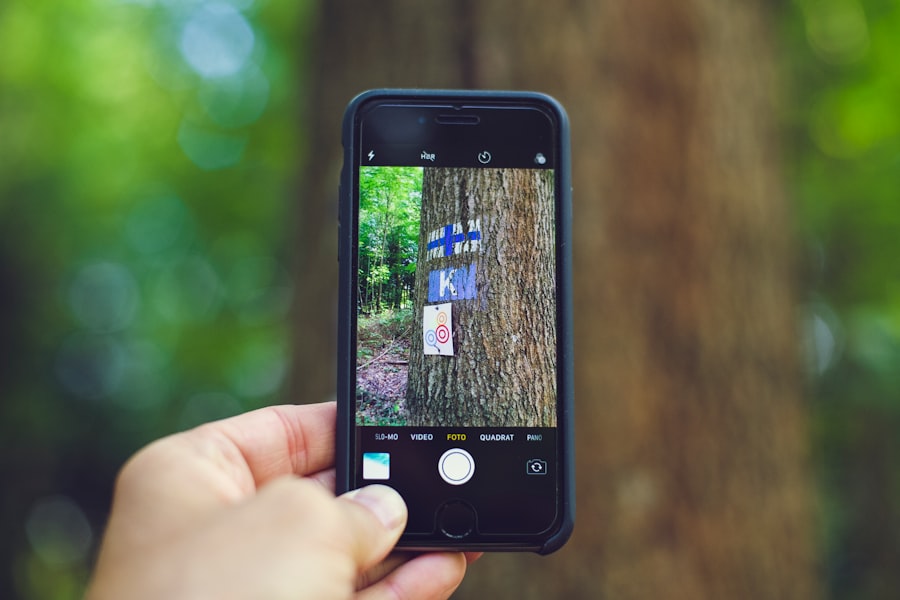In today’s fast-paced digital world, phone addiction has become a prevalent issue that affects individuals across all age groups. You may find yourself reaching for your smartphone at every opportunity, whether you’re waiting in line, sitting on the couch, or even during meals. This compulsive behavior can stem from various factors, including the instant gratification that social media and notifications provide.
The dopamine rush you experience when receiving likes or messages can create a cycle of dependency, making it increasingly difficult to detach from your device. Moreover, phone addiction is not merely about excessive use; it can also lead to negative consequences in your personal and professional life. You might notice that your relationships suffer as you prioritize screen time over face-to-face interactions.
Your productivity may decline as distractions from your phone interrupt your focus. Understanding the depth of phone addiction is crucial for recognizing its impact on your life and taking the necessary steps to regain control.
Key Takeaways
- Phone addiction is a real issue that can have negative impacts on mental health and well-being.
- Signs of phone addiction include constantly checking your phone, feeling anxious when separated from it, and neglecting responsibilities.
- Setting boundaries with technology use, such as designating phone-free times and spaces, can help combat phone addiction.
- Practicing mindfulness and self-awareness can help individuals become more conscious of their phone usage and its effects on their lives.
- Utilizing behavioral therapy techniques, such as cognitive behavioral therapy, can be effective in addressing phone addiction and changing behaviors.
Recognizing the Signs of Phone Addiction
Recognizing the signs of phone addiction is the first step toward addressing the issue. You may find yourself constantly checking your phone, even when there are no notifications. This compulsive behavior can manifest in various ways, such as feeling anxious or irritable when you can’t access your device.
You might also notice that you spend hours scrolling through social media or playing games, often losing track of time and neglecting other responsibilities. Another sign to be aware of is how your phone usage affects your daily life. If you find that you’re prioritizing your device over meaningful interactions with friends and family, or if you’re sacrificing sleep to scroll through your feed, these are clear indicators of a problem.
By acknowledging these signs, you can begin to take proactive steps toward reducing your dependence on your phone and improving your overall well-being.
Setting Boundaries with Technology Use

Setting boundaries with technology use is essential for regaining control over your life. You might start by establishing specific times during the day when you will check your phone, rather than allowing it to dictate your schedule. For instance, consider designating certain hours as “phone-free” times, such as during meals or before bedtime.
This practice can help you cultivate more meaningful interactions with those around you and improve your sleep quality. Additionally, you can create physical boundaries by designating a specific spot in your home for your phone when it’s not in use. By keeping it out of reach, you reduce the temptation to mindlessly check it throughout the day.
You may also want to turn off non-essential notifications to minimize distractions. By taking these steps, you empower yourself to reclaim your time and focus on what truly matters.
Practicing Mindfulness and Self-Awareness
| Metrics | Results |
|---|---|
| Number of minutes spent practicing mindfulness daily | 30 minutes |
| Self-awareness exercises completed per week | 5 exercises |
| Reduction in stress levels after practicing mindfulness | 20% decrease |
| Improvement in focus and concentration | 15% increase |
Practicing mindfulness and self-awareness can significantly enhance your ability to manage phone addiction. You might begin by incorporating mindfulness techniques into your daily routine, such as meditation or deep-breathing exercises. These practices can help you become more attuned to your thoughts and feelings, allowing you to recognize when you’re reaching for your phone out of habit rather than necessity.
Self-awareness is equally important in this journey. Take time to reflect on how your phone usage affects your mood and overall well-being. You may want to keep a journal to track your feelings before and after using your device.
This exercise can help you identify patterns and triggers that lead to excessive use, enabling you to make more conscious choices about when and how you engage with technology.
Utilizing Behavioral Therapy Techniques
Utilizing behavioral therapy techniques can be an effective way to combat phone addiction. Cognitive-behavioral therapy (CBT) is one approach that focuses on identifying negative thought patterns and replacing them with healthier behaviors.
One technique you could implement is the “5-4-3-2-1” grounding exercise, which encourages you to focus on your surroundings rather than your device. When you feel the urge to reach for your phone, take a moment to identify five things you can see, four things you can touch, three things you can hear, two things you can smell, and one thing you can taste. This practice can help redirect your attention and reinforce the importance of being present in the moment.
Implementing Digital Detox Strategies

Implementing digital detox strategies is a powerful way to break free from phone addiction.
During this time, engage in activities that promote connection with yourself and others, such as hiking, reading, or spending quality time with loved ones.
Another effective strategy is to limit the number of apps on your phone. Consider deleting apps that contribute to mindless scrolling or excessive use. By simplifying your digital environment, you create a more intentional space that encourages healthier habits.
You may also want to explore alternative activities that fulfill the same needs that your phone does, such as joining a club or taking up a new hobby.
Creating a Supportive Environment
Creating a supportive environment is crucial for overcoming phone addiction. Surround yourself with individuals who understand your goals and encourage healthier habits. You might consider sharing your intentions with friends and family so they can support you in reducing screen time.
Engaging in group activities that promote face-to-face interactions can also help reinforce positive behaviors. Additionally, consider creating a designated space in your home that fosters relaxation and connection without technology. This could be a cozy reading nook or a game area where you can engage with others without the distraction of screens.
By cultivating an environment that prioritizes real-life connections, you set yourself up for success in overcoming phone addiction.
Using Technology to Combat Phone Addiction
Ironically, technology can also be a valuable ally in combating phone addiction. Numerous apps are designed to help you monitor and limit your screen time effectively. You might explore options like screen time trackers that provide insights into how much time you’re spending on various apps and activities.
This awareness can motivate you to make more conscious choices about your usage. Additionally, consider using apps that promote mindfulness and focus, such as meditation or productivity tools. These applications can help redirect your attention away from mindless scrolling and toward more meaningful activities.
By leveraging technology in a positive way, you can create a healthier relationship with your devices while still enjoying their benefits.
Engaging in Healthy Activities and Hobbies
Engaging in healthy activities and hobbies is essential for filling the void left by reduced phone usage. You might explore new interests or revisit old ones that bring you joy and fulfillment. Whether it’s painting, gardening, or playing a musical instrument, immersing yourself in creative pursuits can provide a sense of accomplishment and satisfaction that screens often cannot replicate.
Physical activities are also an excellent way to combat phone addiction. Consider joining a local sports team or taking up yoga or dance classes. These activities not only promote physical health but also foster social connections that can replace the virtual interactions you’ve been relying on.
By investing time in hobbies that enrich your life, you’ll find it easier to detach from your phone.
Seeking Professional Help and Support
If you’re struggling to manage phone addiction on your own, seeking professional help may be beneficial. Therapists specializing in addiction or behavioral issues can provide valuable insights and strategies tailored to your unique situation. They can help you explore underlying emotional triggers contributing to your dependency on technology.
Support groups are another option worth considering. Connecting with others who share similar struggles can provide a sense of community and accountability as you work toward recovery. Whether it’s an online forum or an in-person meeting, sharing experiences and strategies with others can be incredibly empowering.
Maintaining Consistency and Persistence in Recovery
Maintaining consistency and persistence in recovery is vital for overcoming phone addiction. You may encounter setbacks along the way, but it’s essential to remain committed to your goals. Establishing a routine that incorporates healthy habits will help reinforce positive behaviors over time.
Celebrate small victories as you progress on this journey; each step forward is an achievement worth acknowledging. Remember that recovery is not a linear process; it requires patience and dedication. By staying focused on your objectives and continually seeking ways to improve your relationship with technology, you’ll find yourself on a path toward greater balance and fulfillment in life beyond the screen.
In the quest to combat phone addiction, scientific strategies are increasingly being explored to help individuals regain control over their screen time. One such approach involves understanding the psychological triggers that lead to excessive phone use and implementing behavioral interventions to mitigate these triggers. For those interested in delving deeper into this topic, an insightful article can be found on Unplugged Psych’s website. This article discusses various psychological techniques and strategies that can be employed to reduce phone dependency. You can read more about these strategies by visiting this page.
LEARN WHY Your Brain Isn’t Addicted to Likes; the Algorithm Gaslights You Daily, Hard.
FAQs
What is phone addiction?
Phone addiction, also known as smartphone addiction, refers to the excessive and compulsive use of smartphones, leading to negative effects on one’s physical, mental, and emotional well-being.
What are the negative effects of phone addiction?
Phone addiction can lead to a variety of negative effects, including decreased productivity, disrupted sleep patterns, increased anxiety and depression, decreased attention span, and strained personal relationships.
What are some scientific strategies to beat phone addiction?
Some scientific strategies to beat phone addiction include setting usage limits, using apps to track and manage phone usage, practicing mindfulness and meditation, engaging in offline activities, and seeking professional help if needed.
How can setting usage limits help beat phone addiction?
Setting usage limits involves establishing specific times and durations for phone usage, as well as designating phone-free zones, such as during meals or before bedtime. This can help individuals regain control over their phone usage and reduce dependency.
How can mindfulness and meditation help beat phone addiction?
Mindfulness and meditation techniques can help individuals become more aware of their phone usage habits and develop the self-discipline to resist the urge to constantly check their phones. These practices can also help reduce stress and improve overall well-being.
How can seeking professional help assist in beating phone addiction?
Seeking professional help, such as therapy or counseling, can provide individuals with personalized strategies and support to address underlying issues contributing to phone addiction. A mental health professional can also offer guidance and resources for developing healthier habits.




